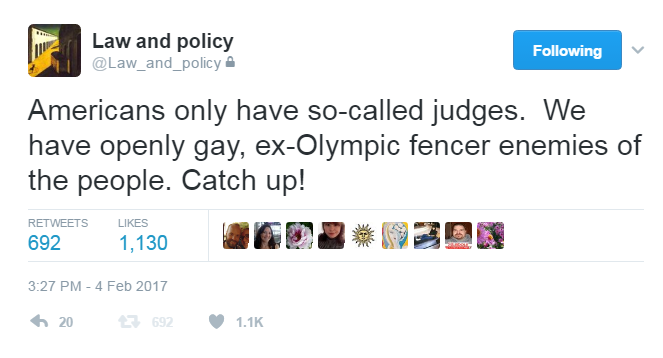Weekly Notes: legal news from ICLR — 6 February 2017
This week’s roundup of legal news and commentary features a poor reflection on parliament, an attempt to bring employment law to heel, an investigation into fake news and a man with a fake tan. Never a dull moment these days. Brexit A Looking Glass Vote ‘I don’t understand you,’ said Alice. ‘It’s dreadfully confusing!’ ‘That’s the… Continue reading
This week’s roundup of legal news and commentary features a poor reflection on parliament, an attempt to bring employment law to heel, an investigation into fake news and a man with a fake tan. Never a dull moment these days.

Brexit
A Looking Glass Vote
‘I don’t understand you,’ said Alice. ‘It’s dreadfully confusing!’
‘That’s the effect of living backwards,’ the Queen said kindly: ‘it always makes one a little giddy at first—’
‘Living backwards!’ Alice repeated in great astonishment. ‘I never heard of such a thing!’
As they talk, the Queen sticks a large piece of plaster on her finger; then she suddenly begins to cry out in pain and complains that her finger is bleeding. Alice asks what the matter is.
‘Have you pricked your finger?’
‘I haven’t pricked it yet,’ the Queen said, ‘but I soon shall—oh, oh, oh!’
Shortly after, fumbling with the brooch of her shawl which has come undone, she accidentally pricks her finger.
‘That accounts for the bleeding, you see,’ she said to Alice with a smile. ‘Now you understand the way things happen here.’
‘But why don’t you scream now?’ Alice asked, holding her hands ready to put over her ears again.
‘Why, I’ve done all the screaming already,’ said the Queen. ‘What would be the good of having it all over again?’
The above extracts from chapter 5 of Alice Through the Looking Glass by Lewis Carroll (1887) seem apt in respect of the order in which certain events at Westminster happened last week. On 1 February the House of Commons voted on a short Bill to give the Prime Minister power to notify the European Council of the UK’s intention to withdraw from the European Union, under the process set out in Article 50 of the Treaty on European Union. On 2 February, the government published its White Paper on the United Kingdom’s exit from and new partnership with the European Union.
That legislators should have been allowed to inform themselves of what they were actually voting for by being able to read the White Paper BEFORE voting to take the step it envisaged seems — in the looking glass world of Westminster — an almost improper suggestion. (The Bill itself, as we described last week, is minimalist in the extreme: see Weekly Notes — 31 January 2017).
Despite this attempt to get Parliament to vote blind, a number of MPs voted against the Bill’s second reading anyway, though not nearly enough to prevent it continuing on its merry way down the corridors of power to the House of Lords, where perhaps there will be more spirited opposition.
You can read a report of proceedings in this House of Lords Library briefing: European Union (Notification of Withdrawal) Bill: Summary of Commons Second Reading Debate.
See also: The New European, Brexit: MPs vote in favour of triggering Article 50.
The 114 MPs who opposed the Bill in the Commons were immediately branded “enemies of democracy who should be made to pay the price at the ballot box” — according to Nigel Farage, whose own experience of the ballot box has been, on seven occasions, a failure to be elected as MP himself.
For a more positive view of their conduct, see The New European, Men and women of conviction – The 114 MPs who voted against Brexit Bill.
The most notable contribution against the government came from its own ranks — the only Tory rebel on the night, but Ken Clarke QC MP more than made up for the lacklustre performance of Her Majesty’s so-called Opposition. Inspiring our own citation of Lewis Carroll (above), he suggested that the promise of riches after Britain departed from Europe were Alice in Wonderland fantasies.
Apparently, when we follow the rabbit down the hole, we will emerge in a wonderland where, suddenly, countries throughout the world are queuing up to give us trading advantages and access to their markets that we were never able to achieve as part of the European Union. Nice men like President Trump and President Erdogan are impatient to abandon their normal protectionism and give us access. Let me not be too cynical; I hope that that is right. I do want the best outcome for the United Kingdom from this process. No doubt somewhere a hatter is holding a tea party with a dormouse in the teapot.”
You can watch his entire speech on video via a link in this report by Business Insider UK, Ken Clarke brands the Tory Party ‘anti-immigrant’ in a memorable anti-Brexit speech to Parliament.
And you can read a transcript of the speech here, via They Work For You.
See also: Guardian, Ken Clarke on Brexit: ‘I’ve never seen anything as mad or chaotic as this’

White (or Blank) Paper
As it happened, the White Paper when it emerged probably wouldn’t have made a huge difference, given that it contained little of real substance. It has a foreword by Theresa May, the Prime Minister, who sets the tone by starting off on the wrong foot:
We do not approach these negotiations expecting failure, but anticipating success.
Because we are a great, global nation with so much to offer Europe and so much to offer the world.
One of the world’s largest and strongest economies. With the finest intelligence services, the bravest armed forces, the most effective hard and soft power, and friendships, partnerships and alliances in every continent.
And another thing that’s important. The essential ingredient of our success. The strength and support of 65 million people willing us to make it happen.”
Given May’s support for grammar schools, it seems odd that she can’t write a proper sentence. But that aside, her assertion that Brexit has the “support of 65 million people willing us to make it happen” is what one can only kindly call these days an “alternative fact”. It’s complete tosh, bunkum, fiddlesticks or what you will. Certainly not true, unless she means the 17m or so fool enough to vote Leave in last year’s referendum, plus 48m or so supporters of Trump, Le Pen, Putin and Erdogan who might wish us ill enough to support them.
The one benefit of May’s foreword is to make what follows — a preface by David Davis, Secretary of State for Exiting the European Union — look good by comparison. His suggestion that we already have a set of rules for trading within the Single Market and all we have to do is keep them (but on the basis we are no longer in the Single Market) would be a stroke of genius but for the rather inconvenient fact that these rules are (a) dependent on being part of the Single Market, which (b) requires us to respect, not trash or pick-n-mix, the “four freedoms” of movement, goods, capital and services.
The document itself seems to be a rather hurriedly put together reiteration, with some padding, of Theresa May’s “hard boiled Brexit” speech about the 12 principles guiding our future relations with Europe and the world (see Weekly Notes — 23 January 2017). But don’t take our word for it. According to Prof Steve Peers, on his EU Law Analysis blog, it’s As Bad as it Gets: the White Paper on Brexit, it’s
the political equivalent of a cat coughing up a hairball.
As many had expected, the white paper is basically content-free. It’s essentially Theresa May’s recent speech (which I analysed here), in some cases word-for-word, with a few statistics and graphs added.
Read the White Paper in full.
Media
Fake news inquiry
The Culture, Media and Sport Committee has launched an inquiry into ‘fake news’ — “the growing phenomenon of widespread dissemination, through social media and the internet, and acceptance as fact of stories of uncertain provenance or accuracy.” It has issued a call for written submissions.
The committee is not alone in voicing concern. As Bryony Hurst reports in a blog post on Inforrm’s blog, moves are afoot in Italy, Germany and other European countries to investigate and deal with the phenomenon: “Fake news is bad, but the ministry of truth is even worse”: Europe Considers Regulation for the Post-Truth Era
But as anyone who has been on Twitter in the last week, or indeed year or two, will be well aware, the most fertile soil for fake news seems to be he United States, where President Trump has appointed key members of staff who seem to exhibit a penchant for “alternative facts”. Indeed, that phrase was coined on air by his counsellor, Kellyanne Conway, in a TV interview about the size, not of his hands, but of the crowd size at his inauguration. When asked why Sean Spicer, Trump’s press secretary, had provided a figure for the inauguration crowd that was incorrect and easily debunked, she blandly said that Spicer had provided “alternative facts”. See: Vanity Fair, Kellyanne Conway Introduces Concept of “Alternative Facts” to Account for Sean Spicer’s Lies
Last week Conway excelled herself by inventing an entire terrorist outrage, the “Bowling Green Massacre” which she said had justified restrictions on immigration imposed by President Obama, which Trump had merely continued. Conway said, when interviewed on MSNBC,
“I bet it’s brand new information to people that President Obama had a six-month ban on the Iraqi refugee program after two Iraqis came here to this country, were radicalised and they were the masterminds behind the Bowling Green massacre. Most people don’t know that because it didn’t get covered.”
As everyone then pointed out, it didn’t get covered because it never happened: as the Guardian reports ( Kellyanne Conway blames refugees for ‘Bowling Green massacre’ that never happened):
Two Iraqi men [who were] arrested in 2011 did live in Bowling Green, Kentucky, and are currently serving life sentences for federal terrorism offences. But there was no massacre, nor were they accused of planning one.
Employment law
Cartoon by @MartinShovel – reproduced with thanks
High heels and even higher fees
The Commons Petitions Committee and Women and Equalities Committee joint Report on High Heels and Workplace Dress Codes, published on 25 January, found that the existing law was not fully effective in dealing with workplace discrimination in matters of dress.
The report was prompted by a petition started by Nicola Thorp, after she was sent home from work for refusing to wear high heels. The petition, calling for it to be illegal for a company to require its female staff to wear high heels at work, had been signed by more than 150,000 people.
The Government said that the dress code imposed on Nicola Thorp was unlawful—but the Committees, having heard evidence from hundreds of women, found that requirements for women to wear high heels at work remain widespread. Other discriminatory dress codes remain widespread. The report concludes that the Equality Act 2010 is not yet fully effective in protecting workers from discrimination. One of the recommendations made was to substantially increase the penalties for employers breaching the law. It says:
Penalties should be set at such a level as to ensure that employees are not deterred from bringing claims, and to deter employers from breaching the legislation.
It also proposes that tribunals should be able to grant injunctions in these types of case. But then it acknowledges that
Far fewer of these cases are being brought, however, following the introduction of employment tribunal fees in 2013… This drop in employment tribunal claims poses an obvious threat to the effectiveness of anti-discrimination law. It is extremely important that a mechanism exists whereby test cases can be brought where employment tribunals may be otherwise unaffordable or unattractive for potential claimants.
Commenting on the report (Putting Women on the front foot: The joint committee report on high heels and dress codes at work) Akua Reindorf at Cloisters chambers, said
discriminatory dress codes can promote the sexualised objectification of women at work, disadvantage people with disabilities, inhibit employment prospects, impair work performance and cause long term and substantial damage to health.
As to the deterrect effect of tribunal fees, she points out:
Dress code cases are a particularly pertinent example of the types of case which are likely to be hit hardest by the introduction of fees: they are difficult to prove, usually low value and tend to affect those in insecure, low paid employment.
The massive increase in tribunal fees has been the subject of considerable complaint and resulted in a 78% slump in claims in the first year after fees of up to £1,200 for a full hearing were introduced.
The fee hike was the subject of a joint review by the Commons Justice and Women and Equalities Committees, whose report on Courts and tribunals fees (HC 167) dated 14 June 2016 recommended, inter alia, that the overall quantum of fees be reduced.
The government did not agree with this recommendation. And last week it issued its response, entitled Review of the introduction of fees in the Employment Tribunals (Cm 9373). Instead, it proposed reforming the Help with Fees scheme, and has launched a consultation, which will close on 14 March 2017, on its proposals. Launching the review on 31 January 2017 it said:
The fall in claims has been significantly greater than was estimated when fees were first introduced. Although we remain satisfied that there are sufficient safeguards in place to make sure that fees do not prevent people from bringing claims before the ETs, there does appear to be evidence that fees have discouraged some people from bringing proceedings. We are therefore consulting on proposals for an adjustment to the Help with Fees scheme to extend the scope of support available to people on lower incomes.
See also: Daily Mirror, Anger as employment tribunal cases plummet after Tories introduce £1,200 fees to get justice at work
Law (and injustice) from around the world
Africa
Collective withdrawal from International Criminal Court
African leaders have adopted a strategy calling for a collective withdrawal from the international criminal court, according to The Guardian. The non-binding decision came behind closed doors near the end of an African Union summit.
In the last year, South Africa, Burundi and the Gambia have all announced plans to leave the court, leading to concerns that other states would follow. They complain that the ICC has focused too narrowly on Africa while pursuing cases of genocide, war crimes and crimes against humanity.
It’s not just African nations who are bailing out. Russia has followed and the Philippines President Rodrigo Duterte has also threatened to leave.
In the wake of last year’s developments, the Law Report podcast, published by ABC in Australia, broadcast an episode entitled Is the ICC in crisis?
It includes an interview with Justice Dennis Davis who sits on the High Court of South Africa and is Judge President of the South African Competition Appeals Court. It also interviews the Chief Justice of Rwanda, Sam Rugege, who says:
The international Criminal Tribunal is a good idea. However, it only seems to prosecute Africans, and one wonders whether it is only Africans who commit humanitarian violations.
Given that neither America nor China have signed up to the ICC, it is perhaps not surprising that other countries are beginning to feel the court is too narrowly, and perhaps discriminatingly, focused on certain types of act by certain types of offender. Or as Chief Justice Rugege says, these great powers just want to be “policemen of the world”.
America
Courts continue to block executive overreach
Last week we reported on the chaos ensuring from the then latest of President Trump’s executive orders, the so-called Muslim travel ban. I use the expression “so-called” advisedly. The ban was not in fact a “ban”, we were later told (by Sean Spicer, Trump’s press secretary), though that was the expression used both initially and since. Moreover, it was clear from the campaign promises which it was said to implement that it was intended by Trump himself to operate as a ban against Muslims, on whose entry into the United States he had called for a “total shut down”.
Be that as it may, the courts have taken the view that it is not legitimate or constitutional, and it has been struck down, by judge after judge after judge. Following the decision of a federal judge in Seattle, U.S. District Judge James L. Robart, to issue a “temporary restraining order” (TRO – a form of injunction) which applied to the whole country, the Department of Homeland Security has “reversed the provisional revocation of visas” for those travelling to the USA. Judge Robart, who was appointed by George W. Bush, also enjoined the government from enforcing a section of the executive order that bars the entry of Syrian refugees.
You can read his opinion here .
Trump himself was not best pleased, and tweeted: “The opinion of this so-called judge, which essentially takes law-enforcement away from our country, is ridiculous and will be overturned!”
He issued other tweets expressing his apparent disdain for the judge and for the independence of the judiciary and the separation of powers.
See Washington Post, Trump lashes out at ‘so-called judge’ who temporarily blocked travel ban
Nomination of Supreme Court justice
It’s against this background that the battle will be fought over the confirmation of Trump’s nomination, to replace the late Justice Scalia on the Supreme Court bench, of Neil Gorsuch, who sits on the United States Court of Appeals for the 10th Circuit in Denver. The issue is clouded by the fact that the Republicans flatly refused to confirm President Obama’s nomination of Judge Merrick B. Garland on the somewhat questionable grounds that it occurred during the last year of Obama’s presidency, and so would be a fraud upon the voters. This has prompted the Democrats to consider blocking Gorsuch’s appointment.
However, he has the support of the acting solicitor general for President Barack Obama, Neal K Katyal, in the New York Times, Why Liberals Should Back Neil Gorsuch
I have no doubt that if confirmed, Judge Gorsuch would help to restore confidence in the rule of law. His years on the bench reveal a commitment to judicial independence — a record that should give the American people confidence that he will not compromise principle to favor the president who appointed him.
If this is so, then Gorsuch may be just the man to face up to Trump. And Paul Karlsgodt writing on ClassActionBlawg (Why Democrats Should Resist Calls to Block Judge Neil Gorsuch’s Supreme Court Nomination) is of the same opinion:
Those who know me know I am no supporter of Trump or his agenda. But perhaps in making the selection of a respected jurist rather than a right-wing hack, he is extending the olive branch to tell America that will respect the judiciary and the rule of law. Or maybe he just didn’t bother to vet Judge Gorsuch enough to understand how antithetical his constitutional philosophy would be to Trump’s apparent efforts to ram through his policy agenda using unchecked executive power.
But not everyone is so sanguine about his suitability.
Interestingly, analysis of his opinions seems to suggest that he is less of a fan of Scalia than Garland, and that he himself prefers to cite Justice Rehnquist (with Scalia coming second). All this thanks to Ravel Law’s What Data Science Can Tell Us about Neil Gorsuch
Lebanon
Judge questions legal basis of anti-homosexuality law
A Lebanese judge, Rabih Maalouf, questioned the interpretation of Article 534 of the Lebanese Penal Code as the legal basis of the arrest of men for same-sex conduct, declaring in a Metn court ruling last week that “homosexuality is a personal choice, not a criminal offence”.
Article 534 states “any sexual intercourse contrary to the order of nature is punishable by up to one year in prison.” The vague wording – what is “the order of nature”? – is open to interpretation and has been used to prosecute people suspected of homosexuality.
Maalouf is not the first judge to question the interpretation of Article 534.
For more, see Human Rights Watch, Lebanon Edges Closer to Decriminalizing Same-sex Conduct
Romania
Protests continue over corruption law change
For the sixth consecutive day, protesters in vast numbers have been gathering in Bucharest in response to a contentious corruption decree which would have decriminalised certain grant offences and protected politicians from prosecution, according to Al Jazeera. An estimated 500,000 protesters rallied in the Romanian capital even after the government announced on Sunday that it had approved the withdrawal of the controversial order. ruling coalition led by Prime Minister Sorin Grindeanu had originally approved the ordinance late on Tuesday, with no input from the country’s parliament, sparking the biggest demonstrations in the country in decades. After repealing the decree, Grindeanu asked the justice minister to prepare a draft law to be sent to parliament for debate and approval.
See also: New York Times, Romania’s Leaders Back Down, but Protesters Aren’t Going Anywhere
And finally… Tweet of the week

That’s it for now. Our thanks to all who flagged up stories, via their blogs (which we always try to acknowledge) and via Twitter (where useful tweets are retweeted).
This post was written by Paul Magrath, Head of Product Development and Online Content at ICLR, who also tweets as @maggotlaw. It does not necessarily represent the opinions of ICLR as an organisation. Comments welcome on Twitter @TheICLR.
Sign up now for weekly email alerts from this blog. Just put your email address into the box on the left.
